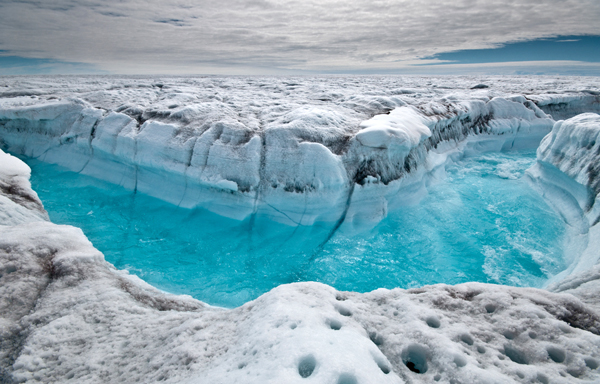Science News
A Warming Planet
November 30, 2012

A new round-up of climate-related stories including trees and drought, melting ice sheets, and fighting ocean acidification.
Another climate and water story
Last week, we featured a series of stories on climate change and water issues and this one slipped by. A study in Nature last week reported how trees physically respond to drought. And the news is not good. Plants undergoing drought stress experience reduced pressure in the xylem (the vessel that transports water from the soil to the leaves).
Head over to NPR to read (or listen to) their piece on the study.
Melting ice sheets and sea level rise
A NASA/ESA study, published in Science this week provides the most thorough representation of the rate of melting ice sheets and corresponding sea level rise to date. Using extensive satellite data, scientists report that the ice sheets covering Greenland and Antarctica are losing more than three times as much ice each year as they were in the 1990s. About two-thirds of the loss occurs from Greenland, with the rest from Antarctica.
Combined, melting of these ice sheets contributed 0.44 inches to global sea levels since 1992. This accounts for one-fifth of all sea level rise over the 20-year survey period. The remainder is caused by the thermal expansion of the warming ocean, melting of mountain glaciers and small Arctic ice caps, and groundwater mining.
“Both ice sheets appear to be losing more ice now than 20 years ago, but the pace of ice loss from Greenland is extraordinary, with nearly a five-fold increase since the mid-1990s,” NASA’s Erik Ivins says.
Ocean acidification and fighting back
Ocean acidification is already having an effect on marine life, according to a study published this week in Nature Geoscience. Shells of live mollusks from the Southern Ocean are showing signs of “severe dissolution.” New Scientist has more information.
Washington State is taking action to curb ocean acidification and protect the state’s large shellfish industry. A report, released this week, outlines plans to target pollution that causes acidification (including carbon emissions and agriculture run-off) and has a $3.3 million backing. More information is available here.
Maybe more coastal states (and nations) will follow Washington’s lead, says the Ocean Conservancy.
A Sad Factoid
A final thought from the editors at grist.org, who note that “if you’re 27 or younger, you’ve never experienced a colder-than-average month.” A truly sobering fact gleaned from the NOAA “State of the Climate” report for October 2012.
Image: Ian Joughin